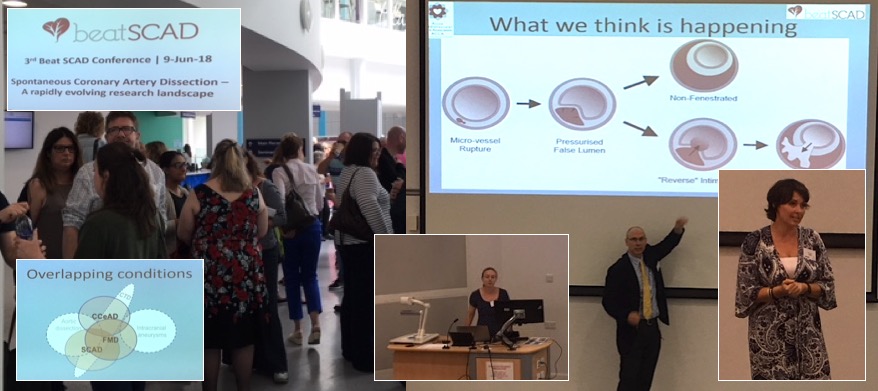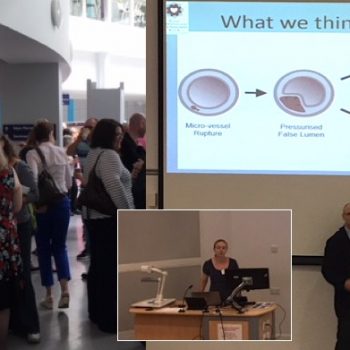Patient group shows power of working together
“Informative and inspirational”. For Cambridge BRC’s Georgina Norris, those two words summed up this year’s Beat SCAD conference, which took place in Birmingham earlier this month.

SCAD – or Spontaneous Coronary Artery Dissection – is a rare cardiac condition, which cannot yet be predicted or prevented. SCAD can cause heart attack, heart failure, cardiac arrest and can be fatal. Although it has been reported across a wide age range, the majority of cases are in young- to middle-aged women.
Georgina – who is Patient & Public Involvement and Engagement (PPI/E) Co-ordinator at the NIHR Cambridge Biomedical Research Centre – said: “I first met Rebecca Breslin, who is one of the charity Beat SCAD’s co-founders, when working on PPI/E projects for rare diseases.
“Rebecca’s story – along with the 68 SCAD survivors who were also at the conference – is incredible.
“Aged just 34, Rebecca had a heart attack. She knew what it was but no one believed her, because she was young, slim and looked healthy.
“Working with Leicester-based interventional cardiologist and lead for the UK SCAD Research Project Dr Adlam at Leicester University, she then made it her mission to find out other people around the country who have also had SCADs.
“This gave Dr Adlam the numbers he needed to run clinical trials to find out more about the disease.”
Patient power
At the conference Rebecca and Beat SCAD co-founder Karen Rockell both spoke about the charity’s fundraising achievements – which last year alone raised £25,000 for research carried out by Dr Abi Al-Hussaini, former research fellow in Leicester and now London- based cardiologist.
Rebecca and Karen also broke the news that a further £50,000 raised by Beat SCAD will help fund future research run by Dr David Adlam and his team.
Georgina said: “Researchers under Dr Adlam are looking to see if SCAD is an inherited condition.
“On the day SCAD research fellow Dr Alice Wood – who is part of Dr Adlam’s team – also talked about her work looking at sub-groups of patients, such as men, pregnant women and those who’ve had recurrent SCADs, and how this will help add missing information to the research jigsaw puzzle.”
Life after SCAD
For Georgina the day was a demonstration of PPI/E in action: “The day showed that when doctors and researchers work with patients and their carers, the results can be amazing.
“We know more about SCAD than we did even five years ago, and the example of Beat SCAD shows what can be achieved through patients joining forces and working with researchers.
“Above all it showed that there is life after SCAD.”
- For more information visit http://beatscad.org.uk/
- Watch a video created by the British Heart Foundation about the SCAD research at the NIHR Leicester Biomedical Research Centre.
- Beat SCAD is a patient-led charity established to raise awareness of SCAD, provide support to patients and others affected by SCAD, and raise money to fund research into SCAD.



